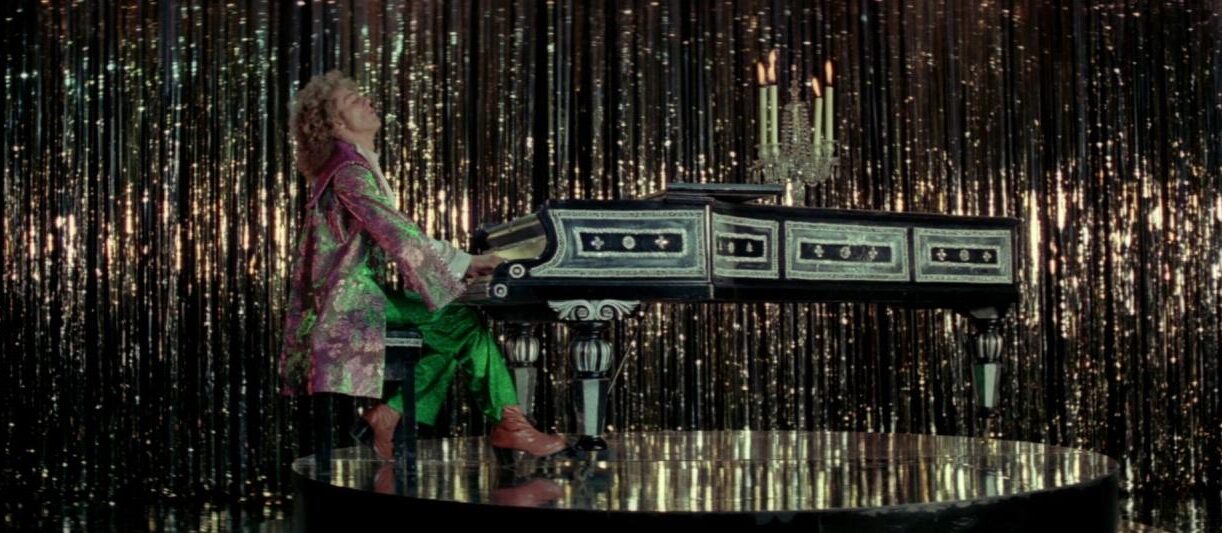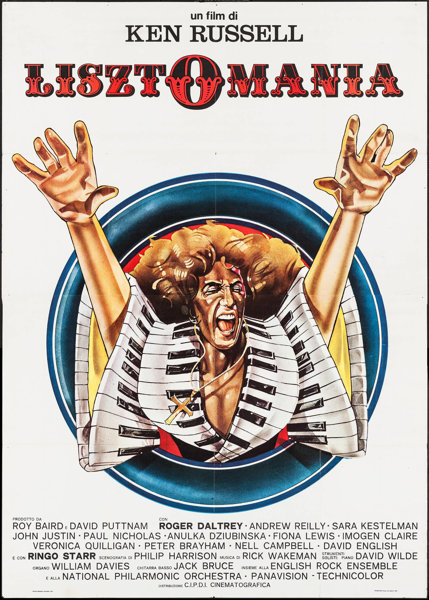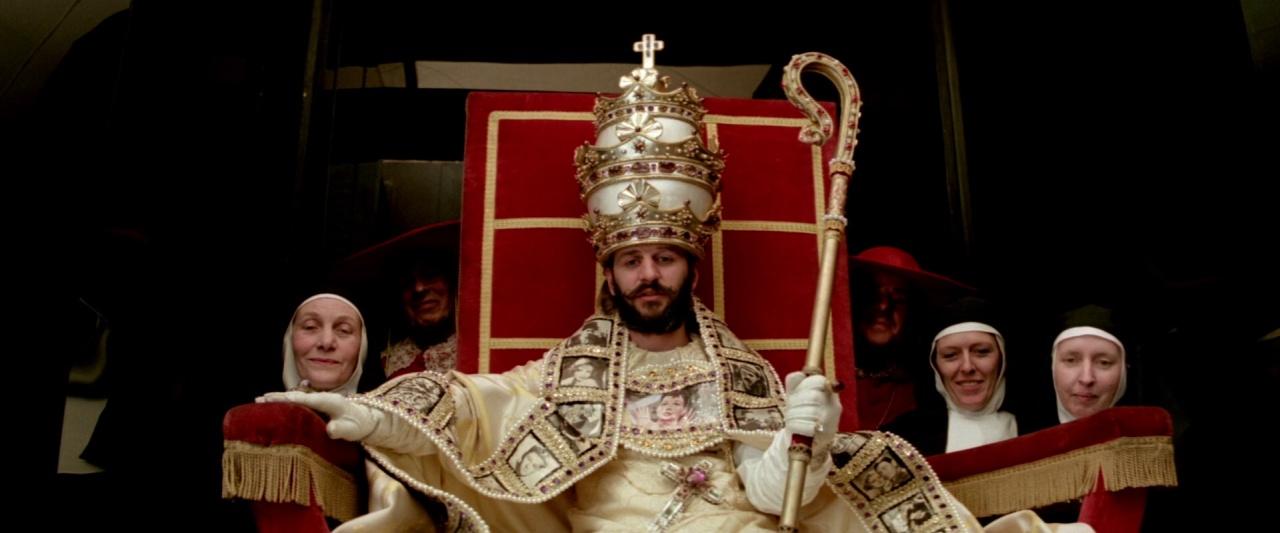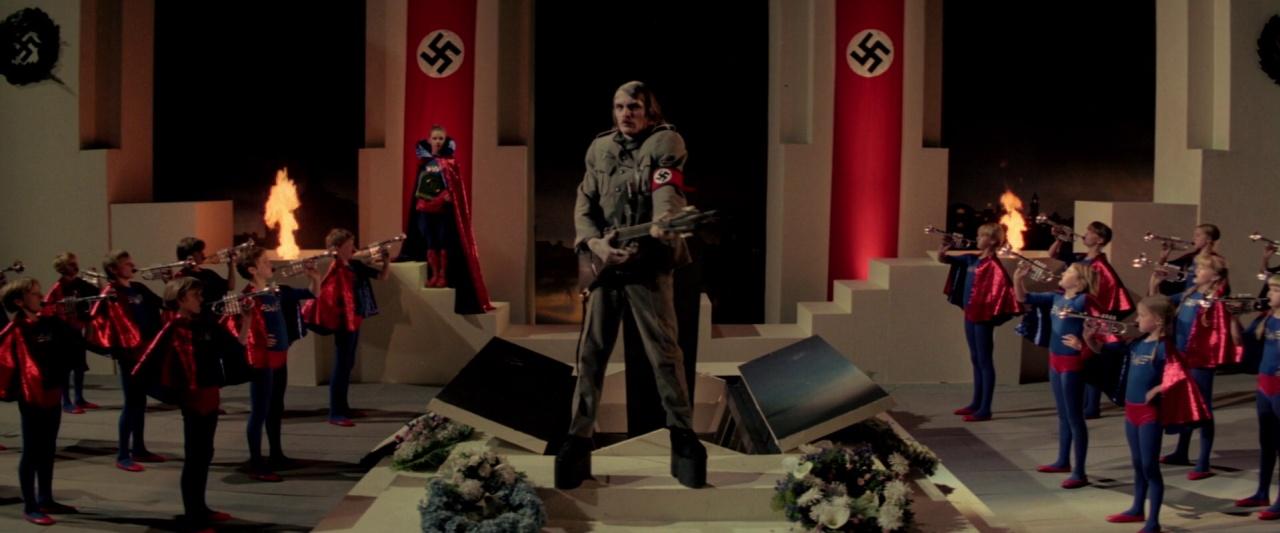

“I’ve polished your sword. What do you want it for? To kill the critics?”
“Time kills critics, my dear.”
Like much of director Ken Russell’s body of work, Lisztomania is quite polarizing. But even within that context it is extreme, perhaps offering the most distinct personal stamp the provocateur ever committed to celluloid. Its flamboyant style and subversive tendencies are made apparent right from the start—a small mercy for people (like my wife) who might have gone for a “freewheeling rock ‘n’ roll fantasy about 19th century composer Franz Liszt,” but who don’t necessarily want to be subjected to oversized genitalia à la the ‘Medicinal Fried Chicken’ episode of South Park.
The film opens on a diamond-encrusted metronome, lazily moving back and forth. In time to the instrument’s steady ticks, Franz Liszt (Roger Daltrey of The Who) alternates between a countess’s (Fiona Lewis) bare breasts with kisses. Left, right, left, right. As the metronome speeds up at her prompting, Liszt goes into demented overdrive with his smooches. Soon the lady’s husband (John Justin), an aging nobleman, bursts into the room, appearing none too pleased that a peasant is rhythmically slobbering all over his wife’s nipples. And then Liszt is up and moving, rapidly covering his nakedness with a makeshift buttflap and engaging in a slapstick swordfight to defend the woman he… loves? An Appalachian hoedown begins playing, with lyrics that describe the situation for the audience. Liszt promptly loses the duel—“Don’t cut off his… genius…”—then finds himself bound inside of a piano alongside his lady friend and placed within the path of an oncoming locomotive. Thus begins Russell’s tribute not to Franz Liszt, but to sexual deviancy, rock ‘n’ roll excess, cinematic rulebreaking, and hypnotic whimsy.

And make no mistake: this is just the start. The film is kind of, vaguely, loosely, about the life of Franz Liszt, the “very first pop star.” At the very least, it uses a surplus of biographical snippets as starting points for totally unrelated tangents. His unhappy marriages, his mistresses, his rivalry with fellow composer Richard Wagner (Paul Nicholas)—these items are touched upon, but only as launching pads for Russell’s bizarre and unrestrained imagination.
Music, like sex, should be approached in the religious spirit as one of the holiest things in life.
Ringo Starr plays the Pope (but of course—after all, Lisztomania was a precursor to Beatlemania). There’s an extended homage to Charlie Chaplin’s The Gold Rush. Liszt gets a ten-foot boner and prances around with half-naked dancers—they circle around the vertical member with ribbons as if participating in a Maypole dance—until Princess Carolyn (Sarah Kestelman) lops his inflated manhood off in a guillotine. (I’m not sure any of these inclusions are “phallic,” that is to say, suggestive, so much as they are just penises.) He becomes a cleric, then an exorcist. Wagner, resurrected as vampiric Frankenstein-Hitler and flanked by children in superhero costumes, unloads bursts of machine gun fire from his weaponized electric guitar into a crowd of Jews (mind you, Wagner died in 1883; Liszt in 1886). Finally, after being killed via voodoo doll by his own daughter (Veronica Quilligan), Liszt saves the world by traveling from heaven back to earth in a pipe organ spaceship alongside all of his mistresses.

With all that mayhem going on, it becomes an afterthought that (like the Russell-directed/Daltrey-starring pop psychedelic Tommy only a few months before it) the film is a musical, and that Daltrey is singing lyrics overtop of some of Liszt’s music. A million other slick gags are overlooked due to the sheer density of the pop culture phantasmagoria (in-jokes involving Russell’s stable of regular actors, a send-up of Daltrey’s bandmate Pete Townsend, a conflation of DC’s Superman and Nietzsche’s Übermensch, contemporary rockstars depicted in the style of Orthodox iconography).
Brash, confrontational, and unapologetic, Lisztomania defies convention and good taste at every turn. It’s not surprising that many find the film downright unpalatable, but it would be silly to deny the energy, imagination, audacity, and technical skill on display. It’s like Tommy, and maybe even bears a passing resemblance to The Rocky Horror Picture Show, only more extreme and less polished for mainstream consumption than either of them. Not many directors are ever given the freedom to produce such a distinctive personal vision on this scale. One wonders what sort of cult following might have developed around the film if the soundtrack had featured songs as catchy as ‘Science Fiction/Double Feature’ and ‘Time Warp’.